143 Search Results for tabi
May 22, 2013
by Robin Parker -
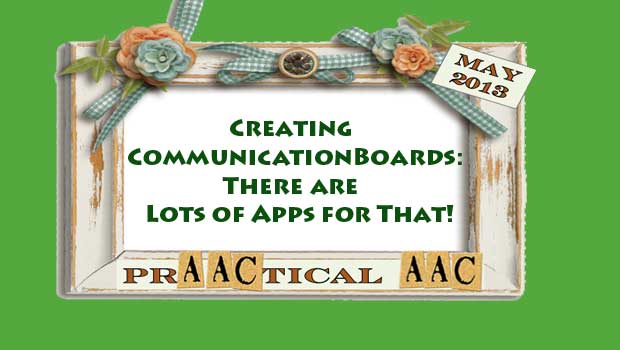
To continue on with the theme of the month, here are some app (and computer based) resources for easily creating your own communication boards: Pogo Boards Pogo Boards is a communication board creator for both the computer and the iOS platform. You can make traditional grid-based communication boards and a variety of other visual supports. Pogo Boards also has a variety of pre-made boards that users share. Price: – Free trial period with premium account, then Free basic account, Subscription price for ongoing premium account Symbly Go & Symbly Symbly is a computer based communication board creator. Communication boards are super easy to create, share, and print out. Symbly Go is an iOS platform app that allows you to view your communication boards (and other visual supports) on your iPad. Your communication boards will automatically be downloaded to your iPad (even when there’s no Internet connection available). There is text to speech capability if... [Read More...]
May 17, 2013
by Robin Parker -
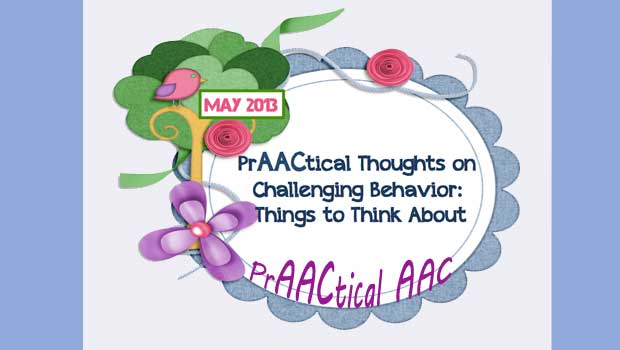
We have had several experiences in the last couple of weeks relating to concerns from SLP’s and educators about challenging behavior (dare we say it might be less structure, less predictability, less routines, or just plain tiredness because it is the end of the school year). Challenging behavior is hard… and disconcerting especially if you feel that you have little control over it (imagine how the learner feels- almost no one wants to be unhappy and out of control). However, there are so many strategies and supports that can improve the situation. It is often about getting back to basics (especially if end of the year issues play into the challenging behavior). The First 5 Questions to Ask: How Does the Learner Communicate? It is important that everyone has a way to communicate their own wants, needs, ideas, interests, and more. It is NOT good enough to just ‘know’ what someone... [Read More...]
May 13, 2013
by Carole Zangari -
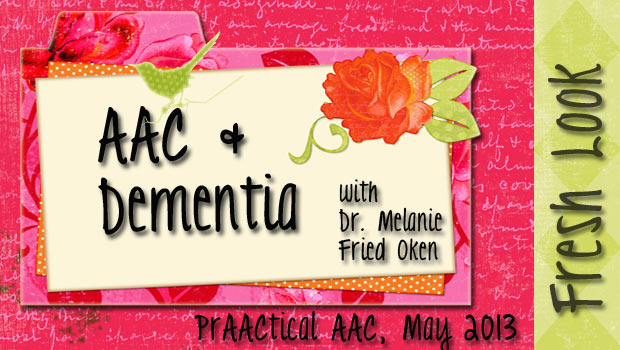
We’re thrilled to continue our Fresh Look series in celebration of Better Hearing and Speech Month (#BHSM). In this post, Dr. Melanie Fried Oken, from the Oregon Health and Science University, talks about some AAC strategies for people with dementia. I was captivated by her 2012 presentation on this topic at ISAAC 2012, and knew it was important to be able to share some of you work with you. We have much to offer these individuals with dementia, and Melanie’s post and linked resources are a great way to get started. ::::::::::::::::::::::::::::::::::::::::::::::::: Hey, what about us AAC providers who work with adults? We love reading PrAACtical AAC and can often adjust the tips, equipment recommendations, and strategies to meet our population needs. So when Carole gave me an opportunity to blog about AAC for adults with dementia, I grabbed the chance. I’d like to share with you some facts about... [Read More...]
April 19, 2013
by Carole Zangari -
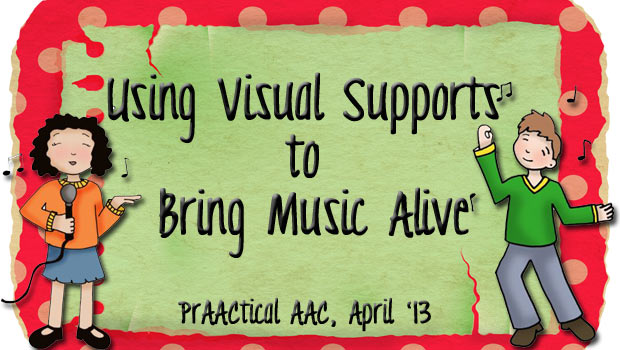
When I first met our guest blogger almost 20 years ago, she was using more visual supports in her music therapy sessions with kids who had ASD than most SLPs were using in their language therapy. Marlene Sotelo has worn many hats in her professional life, but her passion for helping people with ASD communicate more effectively seems to have permeated all of them. In this post, she discusses some of the ways she uses visual supports to help make music therapy effective. Music is a powerful force that transcends time, cultures, and languages. It can transport you to the past, and bring you hope and excitement for the future. In addition, music can be an effective tool in teaching children with varying abilities. The predictability, rhythmic patterns, and repetitive nature of the structure music lends itself to the development of language, cognitive skills, and motor skills, especially for individuals... [Read More...]
April 1, 2013
by Robin Parker -
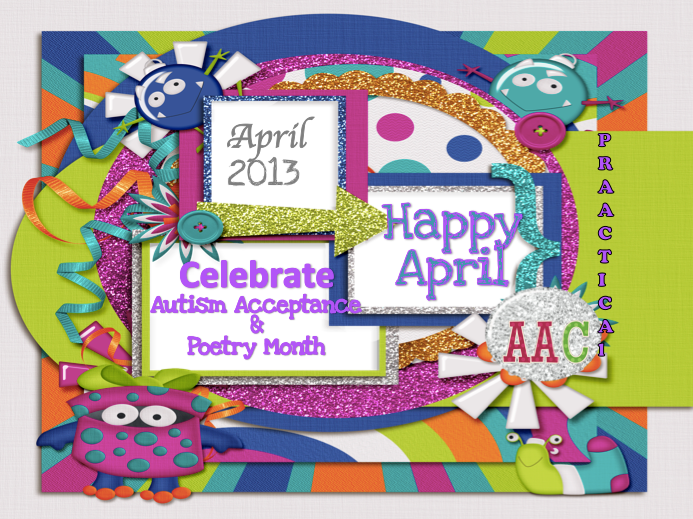
There are a lot of celebrations this month. It is officially Autism Awareness Month. A new name for this that has popped up & taken hold is Autism Acceptance Month. Awareness and/or Acceptance seems to mean different things to different people but hopefully the intent is similar. We hope that this month is filled with great ideas to support ALL people with autism and their families. We hope that educators, clinicians, and whole communities are inclusive, that they presume competence, and that they support communication and language using best prAACtice information and research. We do know that there is more to hope for than just this, like better employment outcomes, more appropriate accommodations, and more individualized support but if focus stays on the former, it seems then that the latter would improve. Plus we have more control (if there is such a thing) on facilitating inclusivity, presuming competence, and of course... [Read More...]
March 26, 2013
by Robin Parker -
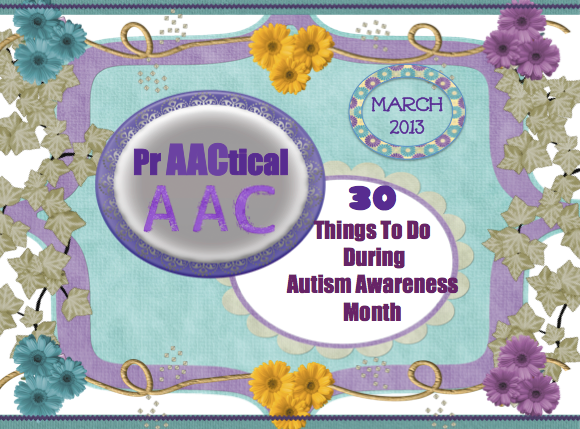
We love getting EVERYONE involved in Autism Awareness/Acceptance Month. We like to take a goal focused approach to our autism activities by choosing projects that facilitate autism awareness & acceptance, positive attitudes, and autism & communication learning. We pass out materials, have contests, go to events, do extra talks, and try and engage EVERYONE we know and even some we do not know. We do a lot of shopping (with small amount of money, but we have to EAT and accessorize). Our families, pets, friends, and students all participate. It is a month filled with purposeful fun. Here are some of the things we will be doing. Please share any activities or projects that you know about. Read & share 5 references that support the use of AAC & Autism (evidence based research) Check out the Online Autistic Carnival which is currently accepting submission of various video documentaries (music, art, writing,... [Read More...]
December 14, 2012
by Robin Parker -
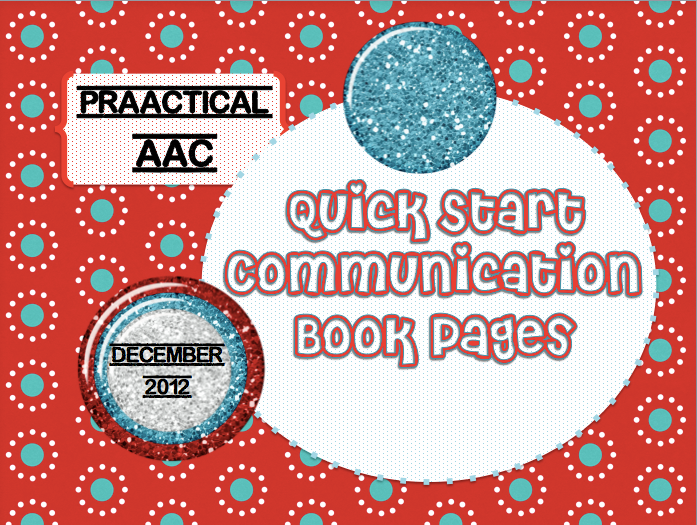
As we are talking about communication boards this month, we wanted to share a great free resource that is available to everyone. ConnectABILITY is a virtual community and website focused on lifelong learning and support for people who have an intellectual disability, their families and their support networks. It is based in Canada and funded by a grant from Ronald McDonald House Charities. We have used many resources from ConnectAbility. We love that you can get information for all ages (children through senior adults). We love the multimedia formats. We have listened to podcasts, read about community and participated in interactive learning. But we absolutely love the Visual Engine which helps you learn about and make visual supports. We LOVE the way you can easily create communication boards and recently realized there are easy ways to add photos, symbols, or even your own pictures or photos. The ‘ease of use’... [Read More...]
November 20, 2012
by Carole Zangari -
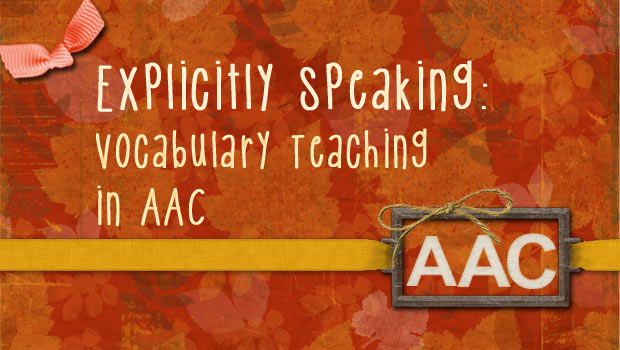
An essential part of the model we shared for AAC semantic intervention is Step 2, teaching the new words with explicit instruction activities. In our posts, explicit instruction refers to the process of designing and using carefully planned sequence of empirically-supported teaching activities. Though focused on reading, not vocabulary, development, this PowerPoint presentation by Dr. Anita Archer gives an excellent overview of the characteristics of explicit instruction. In our initial teaching of new words, we to be sure that the learners have frequent opportunities to respond: Active participation is critical at this point. We have to give the learner a lot of opportunities to say the word (e.g.,“resume”) and tell about it (e.g., “keep going,” “start again and not stop,” “verb”, etc.). We want to elicit a lot of responses so that we can monitor their performance. That allows us to provide feedback that is affirmative when the learners respond... [Read More...]
October 3, 2012
by Robin Parker -
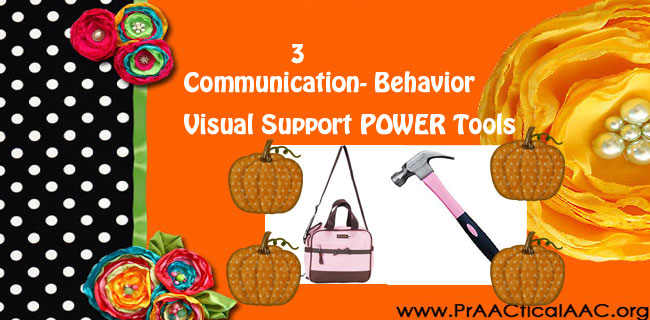
Behavior challenges tend to be a major concern of speech-language pathologists, parents, and educators alike. It is the area that is often most nerve wracking for many professionals and families. But once you get a set of strategies that help you have a plan, most challenging behaviors can be reduced. We like to think of challenging behaviors as opportunities 1: for the learner to practice understanding or expression of communication and language and 2: for facilitators/educators to use behavior strategies or learn new ones. So in order to be best prepared for challenging behaviors, start a Communication-Behavior Strategy Tool Kit. Here some powerful tools that will help ALL learners. 3 Power Tools for Communication & Behavior Choice Boards- helps give a learner power but under our guidelines and boundaries. With choice boards, a student learns more communication while having less power struggles/behavior challenges. Opportunity to teach choice making, expression... [Read More...]
August 27, 2012
by Carole Zangari -
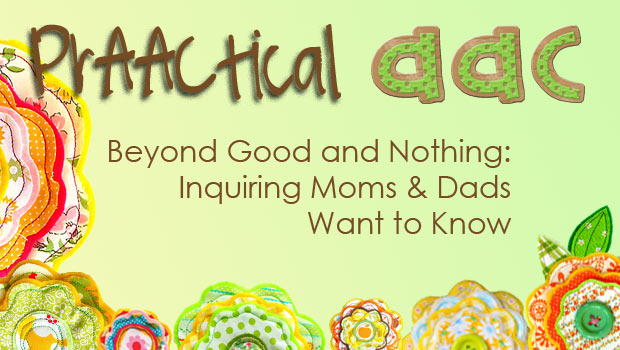
“How was school?” (Good) “What did you do?” (Nothing) This scenario plays out in many cars and kitchens in the after school hours and it can be hard to know who is more frustrated: the kids for being asked or the parents for not getting satisfactory answers. And still, we repeat the process day after day. Of course, we want to know the fine details of what happened and how our children felt, but in some cases, we’d settle for ANY school-related conversation at all. I’ll be the first to admit that it took me way too long to get the hang of how to get information about my children’s school days, and it seemed like just when I did, pow! They were pre-teens and then teenagers. New rule book. Here are some ‘lessons learned’ along the way about those afterschool conversations and some suggestions for parents of the kids... [Read More...]









